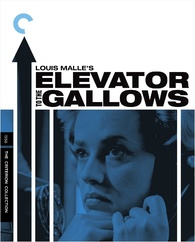Being in the mood for something noir-ish last night, I put on Louis Malle's
Elevator to the Gallows, and man, it was a great choice.
The film begins with a phone call where a woman (Jeanne Moreau) is planning with her lover to bump off her husband (who is also his boss), then meet with her at an assigned rendezvous. The lover successfully carries off the killing, after he surreptitiously reaches the boss' chamber by climbing a rope with grappling hook, and rejoins his colleagues as they quit office for the weekend. But when about to drive off he realizes the rope is still hanging. To remedy the lapse, he again rushes into the building and is going up the elevator when the caretaker shuts off the power; our man is trapped inside.
Outside, his car is stolen by a blowhard delinquent and his girlfriend, who take it for a joyride. They find a gun in the glove compartment, and thus begins their own journey towards violence. Meanwhile, the woman waiting impatiently for the lover that didn't show up, starts trawling through their familiar haunts hoping to get news of him, only aware that she saw his car being driven away earlier with another girl in the passenger seat.
In terms of rational plot, Elevator is not always convincing. If the woman is having a secret affair, how is it that every bartender in town knows who she is going with? Surely that would have been difficult to hide, especially from a husband who seems to be involved in some form of espionage. The behavior of some of the other characters also seems to be decided more by where the plot needs to go at a given moment rather than be an organic expression of their personality.
But it does not matter much because Elevator is a film of style and attitude, and it delivers that in spades. Even when I am not convinced why, I can endlessly watch Jeanne Moreau walking the chiaroscuro Parisian streets at night with a smoky, downbeat Miles Davis trumpet in the background (the score is astounding, and reminds me of one of my favorite albums -
Sunset Mission by Bohren & Der Club of Gore). Everyone is perfect in their parts (look for Lino Ventura turning up later as a detective). It may have been Malle's first fiction film (before this he worked on documentaries with Jacques Costeau), but his style is bold and consistent. Henri Decae's luminous BW photography captures the claustrophobic confines of the elevator (and in a pulse-tingling moment, the shaft) and the gritty streets of Paris with equal flair, and Leonide Azar's editing is deft. This is a film I suspect I will be revisiting several times just to soak in its irresistible brand of elegant melancholy.
The video presentation on Criterion is generally quite good, but some of the darker scenes have a heavier, more swarmy kind of grain. The LPCM audio has no issues, and spectacularly presents the Miles Davis score. Have to look into the extras but this is already a winner for me.
